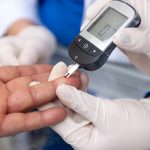World Health Day 2016 is coming up on April 7 and the theme this year is to Beat Diabetes, so topics surrounding type 2 diabetes, diabetes during pregnancy, and glucose intolerance will all be discussed.
In 2008, an estimated 347 million people worldwide had diabetes. Fast-forward to 2012, and diabetes prevalence rose to 1.5 million in deaths and is expected to be the seventh leading cause of death by 2030.
Advertisement
Type 2 diabetes is preventable, so it doesn’t have to become a part of your life. Here is Bel Marra Health’s articles on type 2 diabetes so you can have better odds for beating diabetes.
 Type 2 diabetes risk in women higher with poor sleep
Type 2 diabetes risk in women higher with poor sleep
Type 2 diabetes risk in women is higher with poor sleep or lack thereof, according to new findings. Sleep problems include difficulty falling asleep, staying asleep, or achieving six hours or less of sleep, which have all been shown to increase the risk of type 2 diabetes. The findings reveal that women with poor sleep habits or who suffer from sleep problems have a 45 percent higher risk of type 2 diabetes.
Lead researcher Dr. Yanping Li said, “Women with sleeping difficulty, especially when also having other conditions, should be aware of potential higher risk of diabetes. Doctors should pay more attention to the potential diabetes risk of women who have difficulty falling asleep or staying asleep.”
Dr. Joel Zonszein, director of the Clinical Diabetes Center at Montefiore Medical Center, added, “Not sleeping well affects the circadian rhythm regulated by hormones that are so important for metabolism and involved in control of blood sugar. Thus, it is not surprising that sleep disorders are associated with obesity and diabetes.”
Researchers analyzed data from over 133,000 American women between 2000 and 2014. At baseline, none of the women had diabetes, heart disease, or cancer. Continue reading…
 Type 2 diabetes in women increases heart attack and stroke risk, intense activity may lower risk
Type 2 diabetes in women increases heart attack and stroke risk, intense activity may lower risk
Type 2 diabetes in women increases heart attack and stroke risk, but intense activity may help lower the risk. Women, compared to men, have double the risk of having a heart attack or stroke if they have type 2 diabetes. The findings suggest that additional intense activity could help lower the risk of cardiovascular disease.
Men and women generally have similar rates of type 2 diabetes and those rates continue to climb with each passing year.
Researcher Judith G. Regensteiner said, “Cardiovascular disease may be more deadly for women with type 2 diabetes than it is for men. While we don’t fully understand how the inherent hormonal differences between men and women affect risk, we do know that some risk factors for heart disease and stroke affect women differently than men and there are disparities in how these risk factors are treated.”
Findings of the study revealed that women with type 2 diabetes experience heart attacks earlier than men, have a greater risk of death after a heart attack, are less likely to undergo procedures to unclog arteries or coronary bypass, are less likely to be on cholesterol-lowering medications or blood pressure-lowering medications, are less likely to have their blood sugar and blood pressure under control, and are most likely to develop type 2 diabetes based on gender differences – for example, as a result of polycystic ovary syndrome (PCOS).
Research suggests that women with type 2 diabetes would benefits from more vigorous activity as a means of protecting their heart and lowering their risk of heart attack and stroke. Along with improved diet, women should exercise more intensely and more frequently than men in order to protect their health.
Regensteiner added, “To improve health equity in women and men with diabetes, we need to understand and improve both the biological reasons for the disparities and also control cardiovascular risk factors equally in both women and men. This statement is a call for action to do the compelling research that is so important for all people with diabetes.” Continue reading…
 Type 2 diabetes risk linked to Staphylococcus aureus (staph) bacteria
Type 2 diabetes risk linked to Staphylococcus aureus (staph) bacteria
Risk of type 2 diabetes is linked to Staphylococcus aureus (staph) bacteria. The research comes from Patrick Schlievert from UI Carver College of Medicine, where he and his team found that a toxin produced by staph bacteria caused rabbits to develop symptoms commonly found in type 2 diabetes, including insulin resistance and systemic inflammation.
Schlievert said, “We basically reproduced Type 2 diabetes in rabbits simply through chronic exposure to the staph superantigen.”
The findings suggest that by targeting staph bacteria, there is a potential to prevent type 2 diabetes or even better – to treat it.
A known factor for type 2 diabetes, obesity also changes the gut microbiome. Schlievert added, “What we are finding is that as people gain weight, they are increasingly likely to be colonized by staph bacteria—to have large numbers of these bacteria living on the surface of their skin. People who are colonized by staph bacteria are being chronically exposed to the superantigens the bacteria are producing.”
Previous research from Schlievert found that superantigens disrupt the immune system and are responsible for deadly effects of staph infection.
“I think we have a way to intercede here and alter the course of diabetes. We are working on a vaccine against the superantigens, and we believe that this type of vaccine could prevent the development of Type 2 diabetes,” Schlievert added.
The team is now testing a topical gel intended to kill off staph bacteria from the skin and measure glucose levels in prediabetics to see if there’s any improvement. Continue reading…
 Diabetes 2016 update: 382 million diabetics worldwide, 13 million California adults have prediabetes
Diabetes 2016 update: 382 million diabetics worldwide, 13 million California adults have prediabetes
Diabetes 2016 update: 382 million diabetics worldwide and 13 million California adults have prediabetes, which is a preventable precursor to diabetes.
Diabetes is a global health problem. To address the many issues surrounding diabetes, experts worldwide have come together to offer recommendations on optimizing global diabetes care, which may help tackle the diabetes epidemic. The recommendations were published in the special issue of the Annals of Global Health.
Issue editor Jeffrey I. Mechanick explained, “The multi-faceted nature of diabetes requires an assessment of lifestyle, behavior, genetics and epigenetics, and the intrauterine environment. The problems of one country are not only relevant for that country; information gleaned from a portfolio of countries may generate emergent ideas to solve the complex diabetes problem globally.”
“Not surprisingly, diabetes prevalence rates are increasing the most in rural and low-middle income areas. Cultural differences also have an influence. The lack of guidelines for different target populations and also the interaction of acculturation to Westernized lifestyle with a genetic susceptibility, especially in aboriginal populations, is of concern. Clearly, understanding the effects of one culture in one country can assist diabetes care for patients of the same culture but in another country,” added Dr. Mechanick. Continue reading…
 Diabetes during pregnancy, glucose intolerance associated with low breast milk supply
Diabetes during pregnancy, glucose intolerance associated with low breast milk supply
Diabetes during pregnancy and glucose intolerance are associated with lower breast milk supply. The findings, published in Breastfeeding Medicine, revealed that maternal glucose intolerance can have a negative impact on lactation.
Advertisement
Insulin resistance is common among obese women and obesity is also a risk factor for poor lactation, but this is the first study to explore maternal diabetes as a risk factor for poor lactation.
Lead author Sarah Riddle said, “This study shows the importance of further research to determine how maternal glucose intolerance may impede lactation, so that targeted therapies may be developed to increase milk supply. There are limited evidence-based strategies for helping mothers to increase milk supply, and low milk supply is often cited as the reason for new mothers to stop breastfeeding earlier than planned.”
The study looked at existing electronic medical files of 541 women. Mothers diagnosed with low breast milk supply but not other lactating problems were compared to mothers without any problems or low breast milk supply. Nearly 15 percent in the low breast milk group had a history of diabetes, while only six percent of those with lactation problems but not low breast milk had maternal diabetes. Continue reading…
